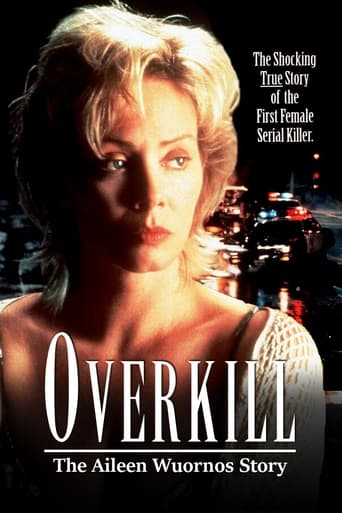

I accept the view of other contributors that this TV version of the story presents a sanitised picture with some aspects of the Wuornos story being reduced or ignored. In particular the motivation behind the murders is only peripherally explored and the true relationship between Wuornos and Tyria is really ignored being presented as room-sharing "sisters" almost.However I do disagree with one commentator who says Jean Smart is awful in the title role. This is an actress I hadn't come across before but I can see from her IMDb entry that she has appeared in many films. I shall certainly keep an eye out for her in the future. I found her performance here compelling. She puts across the serial killer characteristics of someone who can function some of the time in their normal environment in a relatively "normal" manner but who is subsumed by an overwhelming compulsion in other circumstances. The scenes before her capture where she is dancing frenetically and aimlessly in a club and then is slouched in a yard full of bike-riders is a case in point.I think an excellent performance from Smart well supported by Park Overall as Tyria though the police roles are perfunctory and basic at times.Although the Charlize Theron version of this story is much more well known and garnered her worthy accolades this TV film is well worth watching if you get the chance.
... View MoreThis story was done again in 2003. It was done much better. TV movies generally restrict the viewers and this is no exception. It's a horribly botched film with explicit content toned down to fit the television standards. Aileen Wuornos deserves better than this. Her story was done justice in "Monster" (2003) with Charlize Theron, who won an Oscar(tm) for her performance. Just kidding. Both films suck. It's better to stuck to the documentary.Aileen Wuornos was a prostitute with a lesbian lover who murdered her clients. Why? I have no idea; at least not after watching this movie. Jean Smart is bad as Wuornos and the film is incompetent.This is just bad acting filling in for a mediocre movie, and bad directing trying to make up for absence of quality. Bring on the Monster.
... View MoreThis is a competent made-for-TV movie, about average, maybe an iota above that. You can't complain about the acting. Jean Smart has just about the proper appearance, and is of the right age, to be Aileen Wuornos. Unglamorized she seems somewhat used. It's as if she'd once been bruised all over her face and body and has now just about, but not quite, healed. The chief investigator -- Tim Grimm? -- is usually a heavy, and here he looks better than he acts. The director moves the bodies around in front of the camera efficiently. Locations are put to good use, although seeing a meeting of the head detectives take place on an inviting beachfront plaza is a bit disconcerting and suggests a kind of forced use of the scenery. Like Dirty Harry having a chat with his colleagues in the middle of the Golden Gate Bridge. Of course a lot of the dialogue needed to be invented, and the script is weak here and there. When one investigator shouts at the others, something like, "What if she shoots somebody else while we're waiting around? How would you feel about that!", it's a bit hard to swallow -- the notion that an experienced and hardened homicide investigator is going to talk like some guy in a Gestalt group therapy session -- although it's the kind of line that might come readily to a scriptwriter working hurriedly and drawing on his own background. Aileen Wuornos must have been an interesting character. The script tries to explain her serial killings (and all her other less lethal offenses since she was thirteen) by using what's come to be called the abuse excuse. "There is some indication that she was raped as a child by both her brother and step-father," intones a cop. Ho hum. The logical fallacy here is known as "post hoc ergo propter hoc" -- after this, therefore because of this. Certain kinds of social pathology have a tendency to show up more often in particular sectors of social space. It isn't that child abuse and serial killings are exclusively found in one class-related life style than another; it's just that they tend to be concentrated there. You expect impoverished disorganized families to produce child abusers, burglars, pointless murders, and lots of other kinds of illegal behavior, just as you expect a prep school education to be associated with white collar crime. A sad fact but true. But correlation doesn't necessarily mean causality. Because things go together doesn't mean one causes the other. The movie as a whole seems to be biased in favor of Aileen Wuornos and gives her most of the breaks. Not only was she raped, or so it is claimed, but her lesbianism, if that's what it was, is glossed over. And the man we see her kill, an ex police officer, is a pig of a human being -- fat, balding, domineering, brutal, selfish, and probably pulled the wings off flies when he was a kid. If anybody deserves to get it, he surely does. Another development, not the fault of the film, that leaves a kind of sour aftertaste is the betrayal of Aileen by her girlfriend, Tyrea or whatever it was. On a tapped phone, Tyrea prompts Aileen into confessing that she, Aileen, killed those guys all by herself. Tyrea had no idea. Tyrea was also a material witness against Aileen at the trial. Well, it's the smart thing to do, but it doesn't endear Tyrea to us. I felt the same way about Edmond O'Brien's role as an undercover cop in "White Heat," when he insinuates himself into James Cagney's trust and then eagerly squeals on him and shoots him. Or Linda Tripp for somewhat lesser transgressions. I realize it's necessary to keep the streets as clear of murderers as they are, but I wish that doing so didn't require us to play dirty moral pool. Aileen's confession didn't help her any. She was just executed a few weeks ago, Florida being the state that it is.
... View MoreMade the same year as the Nick Broomfield documentary The Selling of a Serial Killer, though presumably after it, since there is talk of the movie rights in the doco, this TVM is the tale of a woman who graduated from being a career criminal and prostitute to the first American female serial killer, accused of killing 7 men in Florida.The strength of this treatment is in the performance of Jean Smart as Aileen, also known as Lee, who is intense and makes odd choices to reveal Aileen's state of mind. She maniacally cleans a crashed car she and hotel maid Tyria Moore (Park Overall) are in, to remove fingerprints and blood as she does in the killings, she is jealous "mean" to Tyria's visiting sister Amy (TC Warner), screams after Tyria cannot be found in their hotel room, fearful when seeing news of the police hunt for her on television, makes one of those cliched waking-from-a-nightmare scenes work for once, and even survives a scene where she dances alone wildly in a pub and is made to see her girlhood reflection in the mirror.Aileen's lesbianism is white-washed here as her being an "older sister" and "the best friend I ever had" to Tyria, and although we see how alcohol alters Aileen's behaviour, we get the standard explaination that her hatred of men, disguised behind provocatism, stems from child abuse. However Smart also makes Aileen's feeling "lost" vulnerable, with a stunned response to men that are nice to her. In the killings we are shown and the aural flashbacks, Aileen's victims are insulting to her (they all call her "baby" and "whore"), and her pathologically angry response explains the title, a police term describing the excess of her gun shooting. Aileen's future is also made more bleak when she "drifts" away from Tyria, and the second half of the narrative focuses on the police efforts to arrest her, since it is her believed her drifting will inevitably result in another killing.The teleplay by Fred Mills has Aileen confess to being "crazy", someone who "doesn't know how to be, sometimes", who justifies her actions by saying that the men who "came to her like flies on crap" "messed" with her. Mills presenting Aileen as a humanitarian, giving money to a homeless person, is inexplicable, though a parallel is made where she hands over the proceeds of the post murder robberies to Tyria, and the duplicity of Tyria as a witness against Aileen has less of an impact than it does in the Broomfield.But while Mills stoops to Tyria explaining Aileen as a hooker as "It's just what she does, not who she is" and later Tyria "I knew it would come to this", he also provides some laugh lines. A policeman tells us that when women kill, they kill people they know, not strangers - "They murder their husbands. They murder their lovers. They murder their husband's lovers", and a pickup tells Aileen "I had an easier time in Nam than I do with most women". Mills also uses flashbacks of Aileen's past which director Peter Levin improves with tinted lighting and bold use of colour, a Santa with a southern accent, the song Crazy on a jukebox, and the police holding a meeting on a beach.Levin cuts from the discovery of one dead body to a child screaming at a party, and from a police image of Aileen's thumbprint to Aileen using her thumb to make a jukebox choice, uses It's a Wonderful Life on TV, dirt on the camera and the car coming at us in the opening crash, but also an unnecessary reflected prison wire pattern on Smart's face for a telephone conversation.
... View More